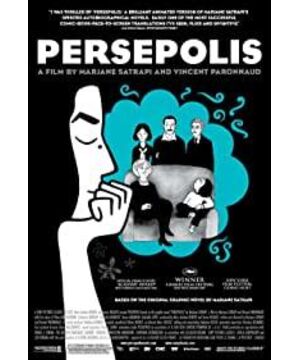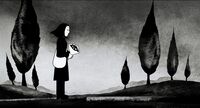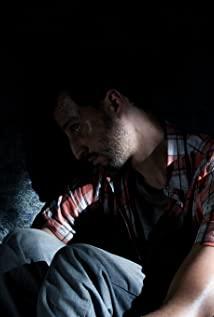Leaving aside the possible "political" propaganda and misleading of the film, at least, I know the non-impressive side of the Iranian people. This is a black and white movie involving orthographic themes. I have always been fascinated by orthographic-themed films, and I can’t read them. Heart, I've always wanted to know how smart people are, they can make the whole world revolve around them, and they can control people's thoughts. You will find that two people's evaluations of the same person are often full of dramatic contradictions, especially when the person being evaluated is good at talking nonsense with his eyes open, and the good drama begins.
Persepolis is a black-and-white animated film, a style I've always been reluctant to try to read. But it's not because science and technology have not developed enough to make color movies and make black and white, but because the author wants it to be black and white; about the expression of animation, because I have been deeply influenced by CCTV children's animation since I was a child, in my Subconsciously, I have always been implicated in animation and childishness. It was not until I had a sense of self-consciousness that I realized that I was superficial. Animation is just a movie, and it has nothing to do with age. Don't you see Japan's Adult animation is made for adults to watch Well. It can be seen that human consciousness is really boring, and it can waste the memory of a generation.
Iran is an ancient civilization with a history of four or five thousand years. It is known as Persia in history. The sacred fire order of our Chinese Mingjiao comes from this mysterious country. In 1963, the Shah of Iran's Pahlavi announced the implementation of the White Revolution. The revolution followed the U.S. blueprint for agricultural and industrial reforms in Iran. In 1979, the Iranian Islamic Revolution broke out in Iran, and the Pahlavi government was overthrown. After Khomeini returned to the country, he held a referendum, abolished the constitutional monarchy, changed the country's name to the Islamic Republic of Iran, and established a system of political and religious integration. In October of that year, Iran's exiled Shah Pahlavi went to the United States to treat lymphoma. The Muslims in Tehran were angry and occupied the US embassy and detained the embassy personnel. History is known as the Iran hostage crisis. Since then, the US has been at odds with Iran. Iran is an Islamic republic dominated by Shiites.
Islam has supreme moral authority in Iran and is the highest norm in public life. Iran's founding leader explicitly rejected Western democratic institutions, and Khomeini made it clear that, in an ideal regime, state power should be in the hands of an imam, and parliament has limited powers. [Iran's Muslim radicals classified the country in the 1980s as an "ideologically directed" state alongside the Soviet Union, a totalitarian state.
The author of this film, Maja Shatabi, was born in Rasht, Iran, and her parents were influenced by communist and socialist ideology. Her mother was the great-granddaughter of Nasser-al-Din Shah, the former Shah of Iran (1848-1896). Shatabie experienced political changes in Iran and the Iran-Iraq war as a child. At the age of 14, her parents sent Shatabi to Vienna, Austria, to continue her studies in order to allow her to escape from the Iranian environment, and then returned to Iran to continue her university studies. During college, Shatabie went through a brief marriage that ended in divorce a year later. She holds a master's degree in visual communication from Azad University, Tehran. She has since moved to Strasbourg, France, to become an illustrator and children's book author. [From Wiki]
The protagonist of the film, Marjane, grew up in the Islamic Republic. It has heard or witnessed this stumbling history, worshipped Bruce Lee since childhood, and bullied his peers like Bruce Lee when he was naughty. People disfigure a politician's son with pushpins; openly challenge the authority of teachers in class, accusing women of the hypocrisy of wearing veils; crazy obsessed with "capitalism falling sign" Michael Jackson; spending savings on the black market to buy crazy Jazz tapes, then lock myself in the room with a badminton racket and shake my hair. After Marjane went abroad to Vienna, she met some friends and started shopping frantically, bars, life, and love, although it turned out that men were unreliable.
What kind of country is suitable for people to live without war? No fear? Don't have to suffer from hunger, don't need to check people's faces? If you want to have a bar party, you have to be sneaky. Is this a reasonable boundary? I can't tell. It's like in "Fight Club", where everyone gathers in an underground fight and beats each other. With blood all over his face, he sincerely hugged each other and thanked each other for his generous boxing. Can such human satisfaction be allowed? What is the limit of the law and the limit of morality? Can the law prohibit people from selling their physical pain? Can morality criticize the "perverted" pleasures that people reveal after group fights? Can this force against social censure can promote human progress? I don't know the answer, but maybe we can think about it another way: at least, they don't have to be afraid of their actions, they don't have moral judges, mind controllers to bind them, they're not cowards.
As the film says: "Never forget that it is fear that makes us lose our sense of self and turns us into cowards". At least, I don't see too much fear in Marjane, she always dares to "rebel" and fight against the social value orientation that everyone thinks is sacred. When the cheerful background music sounded, Marjane started the joy of shopping in an unprecedented supermarket, and she felt "liberated".
I also tried hard to learn M, but I found that when people in a society think that there is no problem with the social value orientation, when people are accustomed to being enslaved, it is impossible to convince the whole society, at least, even I BABAMAMA could not convince.
"Neither do I want people to forget those Iranians who lost their lives in prisons defending their freedom, died in the Iran-Iraq war, suffered under various tyrannical regimes, or were forced to leave their loved ones and their homeland," the authors said. Forgive, but never forget."
View more about Persepolis reviews











